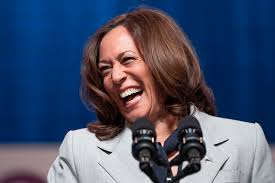Kamala Harris: Rewriting the Image of Prosecutors in American Politics
Kamala Harris, the current Vice President of the United States, has embraced her background as a former prosecutor during her political campaign. In a world where popular culture often portrays prosecutors as antagonists, Harris faces the challenge of reshaping this image while leveraging her experience in law enforcement to appeal to voters. As she continues to champion her career as a prosecutor, Harris is navigating the complex landscape of American perceptions, shaped significantly by decades of media representation.

The Challenge of Hollywood’s Portrayal of Prosecutors
For years, Hollywood has influenced public perception by portraying prosecutors in a less-than-favorable light. From courtroom dramas to crime thrillers, prosecutors often appear as cynical, hard-bitten figures, often outshined by defense attorneys who are depicted as heroic defenders of justice. This trend has created a cultural bias against prosecutors, casting them as second-tier players or even outright villains in the narratives.
Consider iconic characters like Hamilton Burger from Perry Mason—a prosecutor who constantly loses to the defense—or Harvey Dent, who transitions from a justice-seeking district attorney to the villainous Two-Face in the Batman series. These characters contribute to a collective mindset where prosecutors are seen as either ineffectual or morally compromised.
Kamala Harris: Leveraging Her Prosecutorial Background
In her acceptance speech for the Democratic nomination, Kamala Harris highlighted her prosecutorial past, emphasizing her role in charging cases “in the name of the people.” This stance is part of a broader strategy to align her political brand with her law enforcement background. By doing so, Harris aims to counteract her opponent’s narrative that Democrats are soft on crime, while also presenting herself as a strong leader who has taken on powerful adversaries like Donald Trump.
However, Harris’ embrace of her prosecutorial career is not without its risks. Given Hollywood’s long-standing depiction of prosecutors as antagonists, she must work to overcome these ingrained perceptions. Her campaign must navigate the delicate balance between showcasing her strengths as a former attorney general and addressing the negative connotations associated with her profession.
The Cultural Bias Against Prosecutors
Popular entertainment has long favored defense attorneys as the heroes of courtroom dramas. Characters like Atticus Finch in To Kill a Mockingbird and Jake Brigance in A Time to Kill embody the ideals of justice, integrity, and moral courage. In contrast, prosecutors are often portrayed as bureaucratic enforcers of the status quo, more interested in winning cases than in seeking true justice.
This cultural bias is not just a quirk of storytelling; it reflects deeper societal attitudes towards authority figures and the criminal justice system. The American public tends to romanticize the underdog and the outlaw, while viewing prosecutors, who represent the government’s power, with suspicion. This dynamic has made it challenging for real-life prosecutors to gain widespread public support, especially when running for political office.
Hollywood’s Influence on Political Realities
The influence of Hollywood’s portrayal of prosecutors extends beyond entertainment and into the political arena. Historically, candidates with prosecutorial backgrounds have faced difficulties in national elections. Figures like Thomas Dewey, Walter Mondale, and Bob Dole, all former prosecutors, struggled to connect with voters on a personal level, often coming across as too rigid or authoritarian.
In contrast, defense attorneys or politicians with a background in advocacy for the underprivileged have fared better. Presidents like Abraham Lincoln, Franklin D. Roosevelt, and Barack Obama are remembered as champions of the downtrodden, their legacies bolstered by their association with justice and social reform. This historical context adds another layer of complexity to Harris’ campaign, as she must work to align her prosecutorial record with the broader values of justice and equality that resonate with the electorate.
Kamala Harris’ Approach to Rebranding the Prosecutor
Kamala Harris has taken significant steps to rebrand the image of the prosecutor in her campaign. She has emphasized her work against “predators,” big banks, and other powerful entities, positioning herself as a defender of the public against those who would exploit or harm them. Harris’ focus on high-profile cases, such as those involving elder abuse, human trafficking, and financial fraud, helps to highlight the positive impact that a prosecutor can have on society.
Furthermore, Harris has managed to humanize her image through her relatable personality and candid moments. Her trademark laugh and down-to-earth demeanor contrast sharply with the cold, calculating image of prosecutors often seen on screen. This approach has helped her to connect with voters on a personal level, making her appear more approachable and less like the stereotypical prosecutor.
The Road Ahead: Can Harris Overcome the Prosecutorial Stigma?
As Kamala Harris continues her campaign, she faces the ongoing challenge of overcoming the prosecutorial stigma that Hollywood has ingrained in the public consciousness. While her background provides her with a strong foundation to address issues of crime and justice, she must also navigate the cultural bias that favors defense attorneys and underdogs.
The next several weeks will be crucial for Harris as she works to reshape her public image and convince voters that her experience as a prosecutor is an asset, not a liability. Whether or not this strategy will lead to electoral success remains to be seen, but one thing is certain: Harris has already achieved something that Hollywood has struggled with for decades—creating a compelling and sympathetic portrayal of a prosecutor.




